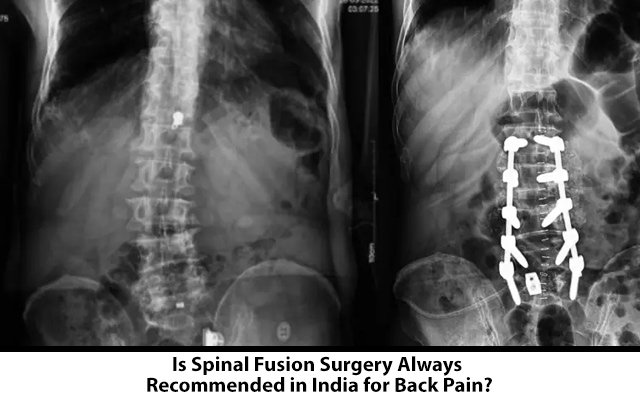Back pain is a common issue that affects millions of people worldwide, including in India. For those dealing with chronic back pain, finding the right treatment can be a challenging journey. Among the various treatment options, spinal fusion surgery is often mentioned. But is it always recommended for back pain in India? Let’s dive into the details to understand this better, especially if you’re considering medical tourism.
What is Spinal Fusion Surgery?
Spinal fusion surgery is a procedure where two or more vertebrae in the spine are permanently joined together to eliminate movement between them. This is done to stabilize the spine and reduce pain caused by conditions like degenerative disc disease, scoliosis, or spondylolisthesis. The surgery involves using bone grafts, metal rods, or screws to fuse the vertebrae.
When is Spinal Fusion Surgery Recommended?
In India, spinal fusion surgery is typically recommended only when other non-surgical treatments have failed. These may include physical therapy, medications, or other less invasive procedures. Here are some specific situations where spinal fusion may be considered:
- Severe Degenerative Disc Disease: When the discs between the vertebrae have worn out significantly, causing chronic pain and instability in the spine, spinal fusion might be necessary.
- Spinal Deformities: Conditions like scoliosis or kyphosis, where the spine has an abnormal curve, might require spinal fusion to correct the alignment.
- Spinal Injuries: Traumatic injuries to the spine that result in fractures or dislocations may need spinal fusion to stabilize the affected area.
- Spondylolisthesis: This is a condition where one vertebra slips over the one below it, leading to pain and instability. Spinal fusion can help in stabilizing the spine.
Is Spinal Fusion Surgery Always the Best Option?
Despite its effectiveness in certain cases, spinal fusion surgery is not always the first choice for treating back pain. Many doctors in India prefer to explore non-surgical treatments before recommending surgery. Here’s why:
- Risks and Complications: Like any surgery, spinal fusion comes with risks such as infection, blood clots, or nerve damage. Additionally, the fused section of the spine may lose flexibility, and the adjacent vertebrae might undergo increased stress, potentially leading to further issues
- Recovery Time: The recovery process after spinal fusion can be lengthy, often requiring several months of rest and rehabilitation. Patients may need to wear a brace and undergo physical therapy to regain strength and mobility.
- Non-Surgical Alternatives: In many cases, non-surgical treatments like physical therapy, chiropractic care, or minimally invasive procedures can effectively manage back pain. These options often come with fewer risks and shorter recovery times.
The Role of Medical Tourism in India for Spinal Fusion Surgery
India has become a popular destination for medical tourism, attracting patients from around the world seeking high-quality and affordable medical treatments, including spinal fusion surgery. The country’s healthcare system offers advanced surgical options performed by skilled surgeons at a fraction of the cost compared to Western countries.
However, it is essential for patients considering spinal fusion surgery in India to consult with a qualified spine specialist who can thoroughly evaluate their condition and recommend the best course of action. Medical tourism companies in India often assist patients in finding reputable hospitals and doctors, ensuring they receive the best care possible.
Conclusion
Spinal fusion surgery is a significant procedure that is not always necessary for treating back pain. In India, doctors typically recommend it only when other treatments have proven ineffective. For those considering this surgery as part of their medical tourism plan, it’s crucial to weigh the benefits and risks and explore all available options. Always consult with a qualified medical professional to determine the most suitable treatment for your specific condition.






